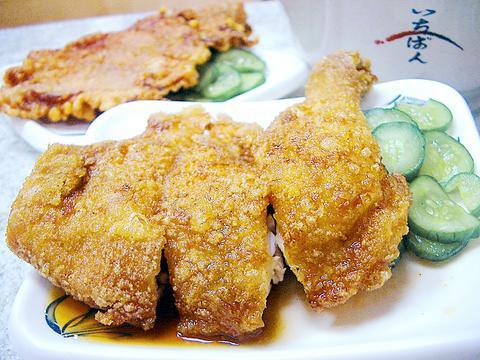For the past 60 years, Yu-lin has been a synonym for fried chicken legs and rice. Situated in a lane in Ximending near the ubiquitous teenage fashion stores, Yu-lin reveals the deep traces of time. The exterior looks just like it did 60 years ago and the delicious taste of fried chicken remains the same.
Third-generation owner Wu Hsin-hui (

PHOTO: YU SEN-LUN, TAIPEI TIMES
When they come out of the frying basket, Yu-lin's chicken legs look as if they're wearing a shiny golden armor, which preserves the juiciness and freshness of the meat. When served, the legs are sprinkled with dark soy sauce and garnished with cucumber slices. With one big bite of the leg, you can enjoy a mixture of crispness, juicy meat and the sweet and sour tastes of the sauce.
Compared with Western fried chicken at fast-food chains, the coating is thinner but equally crispy. To my surprise, after 30 minutes talking with Wu, the cold chicken in front of me still tasted crispy and non-greasy. Wu said the thin coating kept out the grease.
The secret of Yu-lin chicken is the coating of seasoned flour and spices. "Just dip the chicken leg in the mix and you don't need to marinate the meat with any sauce before frying," Wu said.
In the 1970s a well-known food production corporation offered NT$60 million to buy the secret ingredient in Wu's chicken coating, but was rejected. A Japanese food production company even came to Taipei and sent the mix back to the labs to analyze it. The Wu family was even invited to South Korea to fry chicken for its ambassador, as the ambassador frequently used to dine at Yu-lin when he was posted in Taipei.
Now, the Yu-lin fried chicken mix is supplied to more than a dozen fried chicken or spare-rib food chains in Taiwan, including some well-known resort hotels. A small pack (600g) mix can also be purchased here. A lot of Yu-lin's old customers say they cannot forget the taste of its chicken legs long after they emigrate, so Wu sells them the mix. "This is a service to our old guests," he said.
Apart from fried chicken legs and rice or noodles (NT$100), there is also fried spare-rib rice or noodles (NT$90), and fried fish and rice to choose from. The fried tofu (NT$40) is also tasty.

Nov. 11 to Nov. 17 People may call Taipei a “living hell for pedestrians,” but back in the 1960s and 1970s, citizens were even discouraged from crossing major roads on foot. And there weren’t crosswalks or pedestrian signals at busy intersections. A 1978 editorial in the China Times (中國時報) reflected the government’s car-centric attitude: “Pedestrians too often risk their lives to compete with vehicles over road use instead of using an overpass. If they get hit by a car, who can they blame?” Taipei’s car traffic was growing exponentially during the 1960s, and along with it the frequency of accidents. The policy

While Americans face the upcoming second Donald Trump presidency with bright optimism/existential dread in Taiwan there are also varying opinions on what the impact will be here. Regardless of what one thinks of Trump personally and his first administration, US-Taiwan relations blossomed. Relative to the previous Obama administration, arms sales rocketed from US$14 billion during Obama’s eight years to US$18 billion in four years under Trump. High-profile visits by administration officials, bipartisan Congressional delegations, more and higher-level government-to-government direct contacts were all increased under Trump, setting the stage and example for the Biden administration to follow. However, Trump administration secretary

In mid-1949 George Kennan, the famed geopolitical thinker and analyst, wrote a memorandum on US policy towards Taiwan and Penghu, then known as, respectively, Formosa and the Pescadores. In it he argued that Formosa and Pescadores would be lost to the Chine communists in a few years, or even months, because of the deteriorating situation on the islands, defeating the US goal of keeping them out of Communist Chinese hands. Kennan contended that “the only reasonably sure chance of denying Formosa and the Pescadores to the Communists” would be to remove the current Chinese administration, establish a neutral administration and

A “meta” detective series in which a struggling Asian waiter becomes the unlikely hero of a police procedural-style criminal conspiracy, Interior Chinatown satirizes Hollywood’s stereotypical treatment of minorities — while also nodding to the progress the industry has belatedly made. The new show, out on Disney-owned Hulu next Tuesday, is based on the critically adored novel by US author Charles Yu (游朝凱), who is of Taiwanese descent. Yu’s 2020 bestseller delivered a humorous takedown of racism in US society through the adventures of Willis Wu, a Hollywood extra reduced to playing roles like “Background Oriental Male” but who dreams of one day